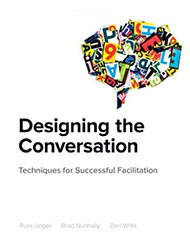Brad Nunnally is an Innovation Specialist at 18F and a co-author of “Designing The Conversation: Techniques for Successful Facilitation” for New Riders (Voices That Matter). During his career, Brad has worked with clients spanning almost every major industry, mostly focusing on healthcare and financial services. For the past few years, Brad has enjoyed writing and speaking on topics that include user research, interactive prototyping and cognitive psychology and how it applies to design.
Recently, he has taken that passion to the federal government by accepting a fellowship with 18F. He now spends his days contemplating how the government can be redesigned to be more people focused. When he is not thinking about user experience, he captures the world around him by practicing amateur photography and learning important life lessons from his children.
Author of:
Author of:
Techniques for Successful Facilitation
with Russ Unger and Dan Willis New Riders
25
9:00 - 12:30
Room 5Workshop
Field Research Techniques
Regardless if it’s the first time or your hundredth time, conducting any sort of field research is always a bit of a daunting task. The planning and conducting of field research is a juggling act between prep work, interview skills, and synthesis of research data. While it does take practice and experience to get comfortable with the act of field research, there are lessons you can learn that will help you get past many rookie mistakes and get you to collecting invaluable information.
Attendees of the workshop will learn how to go through the key steps for planning, conducting, and analyzing user research. This workshop is very hands on, and includes conducting actual user research to get attendees experience asking questions and interacting with people out in the wild.
What will be covered?
This workshop will cover key aspects of three main stages of conducting field studies and provide practical exercises. These three stages include:
- Planning and Prep: Good research data starts with proper planning. This involves everything from writing interview questions, developing an interview guide, recruiting participants, and determining the logistics for the interview sessions.
- Out in the Field: Conducting this type of research can drain you physically and mentally. There are a number of tricks that help you keep your mind sharp and allow you to give each session the same amount of energy as the first.
- Finding the Patterns: The number of data points that result from field research grows quickly. Aside from time, certain techniques exist that help you get through this mountain of information and get to the findings you need to be successful.
Who is this workshop for?
This workshop is for designers who has little or no experience doing hands on user research, but want to learn how to get involved with research and maybe start to do research themselves.
26
14:35 - 15:10
Auditorium ITalk
See What I Mean
As designers, we are lucky enough to get to interact with many different types of people during the course of our work. We observe people using technology and proposed design solutions. While working on our projects, we collaborate directly with our team, clients, and stakeholders to bring a solution to life. All of this interaction exposes us to lots of body language. The language of the body offers up many hints and insights into what people are thinking and feeling. It's been said that our bodies tell us what is really on our minds, and it’s important to know not only what others might be telling you but what you could be telling them.
It's important for designers to have a fundamental understanding of body language and what are key signs to look for when interacting with users or project teams. There are key patterns that, when observed correctly, can tell you if someone is supportive of your idea, hiding their true feelings, or simply sitting back and daydreaming the meeting away.

